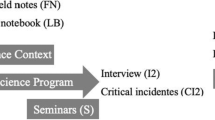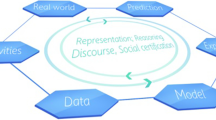Middle school science teachers were involved in a problem-solving experience presented and guided by research scientists. Data on the teachers’ perspectives about this professional development and any impact it may have had on their teaching practices were collected through interviews, surveys, and classroom observations. The findings show that the professional development experience was positive, although one concern expressed by teachers was their lack of understanding of the scientists’ vocabulary. Using scientists and real-world scenarios was shown to be an effective strategy for encouraging middle school teachers to teach science as a process and help them strengthen their science content understanding.
Similar content being viewed by others
References
Bryan, L. A., & Abell, S. K. (1999). The development of professional knowledge in learning to teach elementary school. Journal of Research in Science Teaching, 36, 121–139.
Bogdan, R. C., & Biklen, S. K. (1998).Qualitative research in education: An introduction to theory and methods. Needham Heights, MA: Allyn and Bacon.
Committee on Science and Mathematics Teacher Preparation. (2001). Educating teachers of science, mathematics, and technology: New practices for the new millennium. Washington, DC: National Academy Press.
Crawford, B. A. (2000). Embracing the essence of inquiry: New roles for science teachers. Journal of Research in Science Teaching, 37, 916–937.
Cronin-Jones, L. L. (1991). Science teacher beliefs and their influence on curriculum implementation: Two case studies. Journal of Research in Science Teaching, 28, 235–250.
Czerniak, C. M., & Lumpe, A. T. (1996). Relationship between teacher beliefs and science education reform. Journal of Science Teacher Education, 7, 247–266.
Darling-Hammond, L., & McLaughlin, M. (1995). Policies that support professional development in an era of reform. Phi Delta Kappan, 76, 597–605. Retrieved February 10, 2005, from http://proquest.umi.com
Eisenhower National Clearinghouse for Mathematics and Science Education. (no date). Ideas that work: Science professional development. Columbus, OH: Author.
Garet, M. S., Porter, A. C., Desimone, L., Birman, B. F., & Yoon, K. S. (2001). What makes professional development effective? Results from a national sample of teachers. American Educational Research Journal, 38, 915–945.
Grazer, B. (Producer), Howard, R. (Director), & Lovell, J. (Writer). (1995). Apollo 13 [Motion picture]. United States: Universal City Studios.
Keys, C. W., & Bryan, L. A. (2001). Co-constructing inquiry-based science with teachers: Essential research for lasting reform. Journal of Research in Science Teaching, 38, 631–645.
Keys, C. W., & Kennedy, V. (1999). Understanding inquiry science teaching in context: A case study of an elementary teacher. Journal of Science Teacher Education, 10, 315–333.
Loucks-Horsley, S., Hewson, P. W., Love, N., & Stiles, K. E. (1998). Designing professional development for teachers of science and mathematics. Thousand Oaks, CA: Corwin Press.
Magnusson, S., Krajcik, J., & Borko, H. (1999). Nature, sources, and development of pedagogical content knowledge for science teaching. In J. Gess-Newsome & N. Lederman (Eds.), Pedagogical content knowledge and science education (pp. 95–132). Dordrect, The Netherlands: Kluwer Academic Publications.
Moreno, N. P. (1999). K–12 science education reform: A primer for scientists. Bioscience, 49, 569–577. Retrieved February 10, 2005, from http://proquest.umi.com.
National Research Council. (1996a). National science education standards. Washington, DC: National Academy Press.
National Research Council. (1996b). The role of scientists in the professional development of science teachers. Washington, DC: National Academy Press.
National Research Council. (2000). Inquiry and the national science education standards. Washington, DC: National Academy Press.
Orlich, D. C. (1996). Designing successful grant proposals. Alexandria, VA: Association for Supervision and Curriculum Development.
Supovitz, J. A., & Turner, H. M. (2000). The effects of professional development on science teaching practices and classroom culture. The Journal of Research in Science Teaching, 37, 963–980.
Tobin, K., Tippins, D. J., & Gallard, A. J. (1994). Research on instructional strategies for teaching science. In D. L. Gabel (Ed.), Handbook of research on science teaching and learning (pp. 45–93). New York: Macmillan.
Acknowledgments
The middle school science materials used in this project were funded by the Washington State Office of the Superintendent of Public Instruction through a grant to the Pacific Science Center. The scientists and engineers involved in the project were supported by the Pacific Northwest National Laboratory operated for the U.S. Department of Energy by Battelle Memorial Institute under contract DE-AC06-1976RLO.
Author information
Authors and Affiliations
Appendix
Appendix
Interview questions: LASER research
LASER experiences:
-
1.
List and describe any experiences you have had with the LASER program (SPI, YV/TC, districtwide trainings, etc)
-
2.
Describe any science kit/module trainings that you have been involved in.
-
3.
Describe any other LASER professional development experiences in which you have been involved.
-
4.
Describe your school’s involvement in the LASER program. Describe your district’s involvement
-
5.
What have you seen at your school or at the district level that has occurred due to the LASER program?
-
6.
Describe your role in the LASER SE Regional Materials Center curriculum adoption.
Nature of Science/Teaching Science
-
1.
What is science? Can you describe what it means to you?
-
2.
Do you think of science as a process? What does that process look like?
-
3.
How do you feel is the most effective way to teach science?
-
4.
How do you convey science concepts to your students?
-
5.
Define inquiry-based science teaching.
-
6.
What would an inquiry-based science lesson look like in your classroom?
-
7.
How do you know if a student understands a science concept?
-
8.
What are things that you look for in students when checking for understanding?
-
9.
What strategies do you use to assess your students’ learning of science?
Kits/Units
-
1.
What is your reaction to using science modules to teach middle school science?
-
2.
Are there any benefits to using the science modules?
-
3.
What are some of the concerns you have with using modules to teach science?
-
4.
If you don’t have prior experience with or knowledge of the science content in a specific module, what do you need to gain this?
-
5.
What do you need to know or have before teaching a science module?
-
6.
What resources might you need while teaching with a science module?
-
7.
Describe the science content you might need to teach the module you have been assigned. How confident do you feel about this content?
About this article
Cite this article
Morrison, J., Estes, J. Using Scientists and Real-World Scenarios in Professional Development for Middle School Science Teachers. J Sci Teacher Educ 18, 165–184 (2007). https://doi.org/10.1007/s10972-006-9034-3
Published:
Issue Date:
DOI: https://doi.org/10.1007/s10972-006-9034-3




